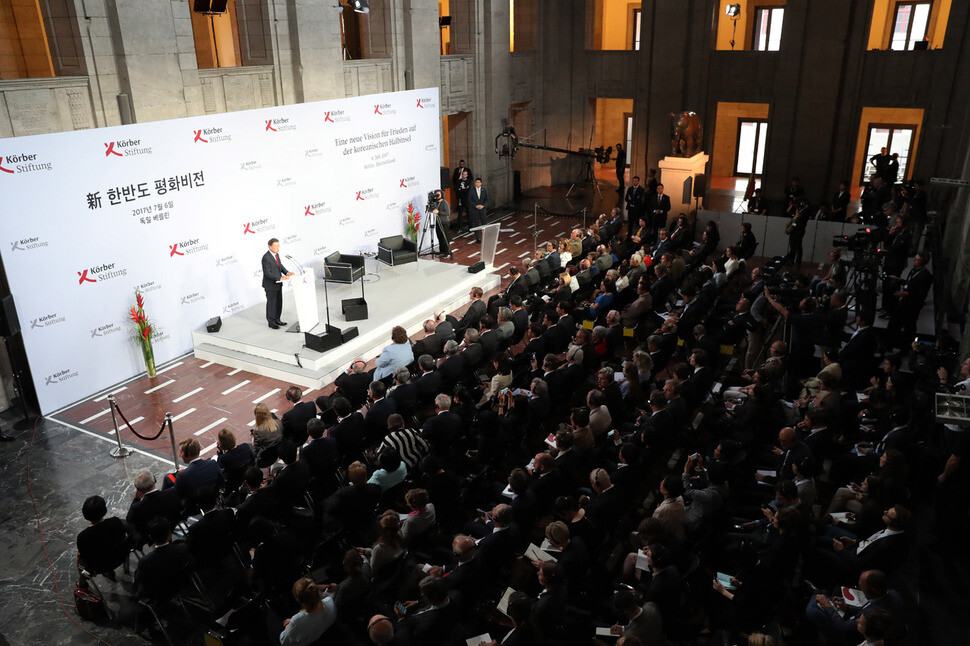hankyoreh
Links to other country sites 다른 나라 사이트 링크
Experts say North Korea unlikely to respond to Pres. Moon’s family reunions offer right away

President Moon Jae-in proposed four tasks for practice in Berlin on July 6, including the holding of divided family reunions on Oct. 4, and the next question is how Pyongyang will respond.
In the past, North Korea has responded to the Moon administration’s attempts to begin improving inter-Korean relations with the resumption of humanitarian aid and other forms of private exchange by stressing that political and military issues need to be resolved first. Moon’s speech is being seen as an attempt to give the North something of an answer to those calls.
“He is talking about stating the Moon Jae-in administration’s political and military vision and beginning with social and cultural exchange,” explained Inje University professor Kim Yeon-chul.
“North Korea may feel it would be justified in answering,” he said.
Kim predicted North Korea would “have a hard time saying no, since this is a kind of answer [from the Moon administration] to its position.”
Another of Moon’s proposals, the mutual cessation of hostilities at the Military Demarcation Line, is also a response to one of nine questions posed in a June 23 open letter by the North Korean National Reconciliation Council titled “Questions for South Korean Authorities in the Name of the Entire [Korean] People.” It further carries the meaning of restoring a 2004 agreement on “prevention of unintended clashes in the West (Yellow) Sea, a halt to propaganda activities at the Military Demarcation Line, and removal of means of propaganda” announced by the two sides in 2004 as a way of reducing military tensions.
“There is a chance North Korea could show an interest in this part,” predicted University of North Korean Studies professor Yang Moo-jin.
But analysts generally predicted Pyongyang was unlikely to respond to Moon’s proposal right away - especially in light of its July 4 test-launch of the ICBM-level Hwasong-14, which Seoul and Washington have called a “strategic provocation.”
“The biggest problem is that there’s no answer on how to get [North Korea] to show up for dialogue,” said one North Korea expert, on condition of anonymity, about Moon’s message stressing the need for inter-Korean dialogue.
The expert predicted Pyongyang was “unlikely to accept the proposal, given that it doesn’t say anything about the ‘two halts’ [a freeze of North Korean nuclear and missile activities in exchange for a halt to South Korea-US joint military exercises] that North Korea and China have repeatedly demanded.”
Moon’s vision may also be unlikely to come to pass soon unless some breakthrough is made before the South Korea-US Ulchi-Freedom Guardian joint military exercises, which are scheduled to start around Aug. 21.
More fundamentally, the fact that North Korea’s aim is negotiation with the US - with the clear goal of securing status as a nuclear power - suggests Pyongyang is unlikely to answer Moon’s proposal unless some progress can be made toward a resolution in that area.
The response of North Korean International Olympic Committee member Chang Ung to proposals to use the 2018 Pyeongchang Olympics as an opportunity to forge peace also makes any prediction of success uncertain. On July 1, Chang described the idea of achieved a thaw in inter-Korean relations through sports as “extremely naive” and “expecting too much.”
By Kim Ji-eun, staff reporter
Please direct questions or comments to [english@hani.co.kr]

Editorial・opinion
![[Editorial] Intensifying US-China rivalry means Seoul must address uncertainty with Beijing sooner than later [Editorial] Intensifying US-China rivalry means Seoul must address uncertainty with Beijing sooner than later](https://flexible.img.hani.co.kr/flexible/normal/500/300/imgdb/original/2024/0517/8117159322045222.jpg) [Editorial] Intensifying US-China rivalry means Seoul must address uncertainty with Beijing sooner than later
[Editorial] Intensifying US-China rivalry means Seoul must address uncertainty with Beijing sooner than later![[Column] When ‘fairness’ means hate and violence [Column] When ‘fairness’ means hate and violence](https://flexible.img.hani.co.kr/flexible/normal/500/300/imgdb/original/2024/0516/7417158465908824.jpg) [Column] When ‘fairness’ means hate and violence
[Column] When ‘fairness’ means hate and violence- [Editorial] Yoon must stop abusing authority to shield himself from investigation
- [Column] US troop withdrawal from Korea could be the Acheson Line all over
- [Column] How to win back readers who’ve turned to YouTube for news
- [Column] Welcome to the president’s pity party
- [Editorial] Korea must respond firmly to Japan’s attempt to usurp Line
- [Editorial] Transfers of prosecutors investigating Korea’s first lady send chilling message
- [Column] Will Seoul’s ties with Moscow really recover on their own?
- [Column] Samsung’s ‘lost decade’ and Lee Jae-yong’s mismatched chopsticks
Most viewed articles
- 1Celine Song says she’s gratified global audiences have responded to the kismet of ‘inyeon’
- 2[Editorial] Transfers of prosecutors investigating Korea’s first lady send chilling message
- 3[Exclusive] Unearthed memo suggests Gwangju Uprising missing may have been cremated
- 4[Column] US troop withdrawal from Korea could be the Acheson Line all over
- 5For new generation of Chinese artists, discontent is disobedience
- 6Xi, Putin ‘oppose acts of military intimidation’ against N. Korea by US in joint statement
- 7Highly educated high-earners at risk of being replaced by AI, BOK study says
- 8Could Korea’s Naver lose control of Line to Japan?
- 9[Editorial] Intensifying US-China rivalry means Seoul must address uncertainty with Beijing sooner t
- 10Japan begins dumping irradiated Fukushima water amid outpouring of concern about vague timeline